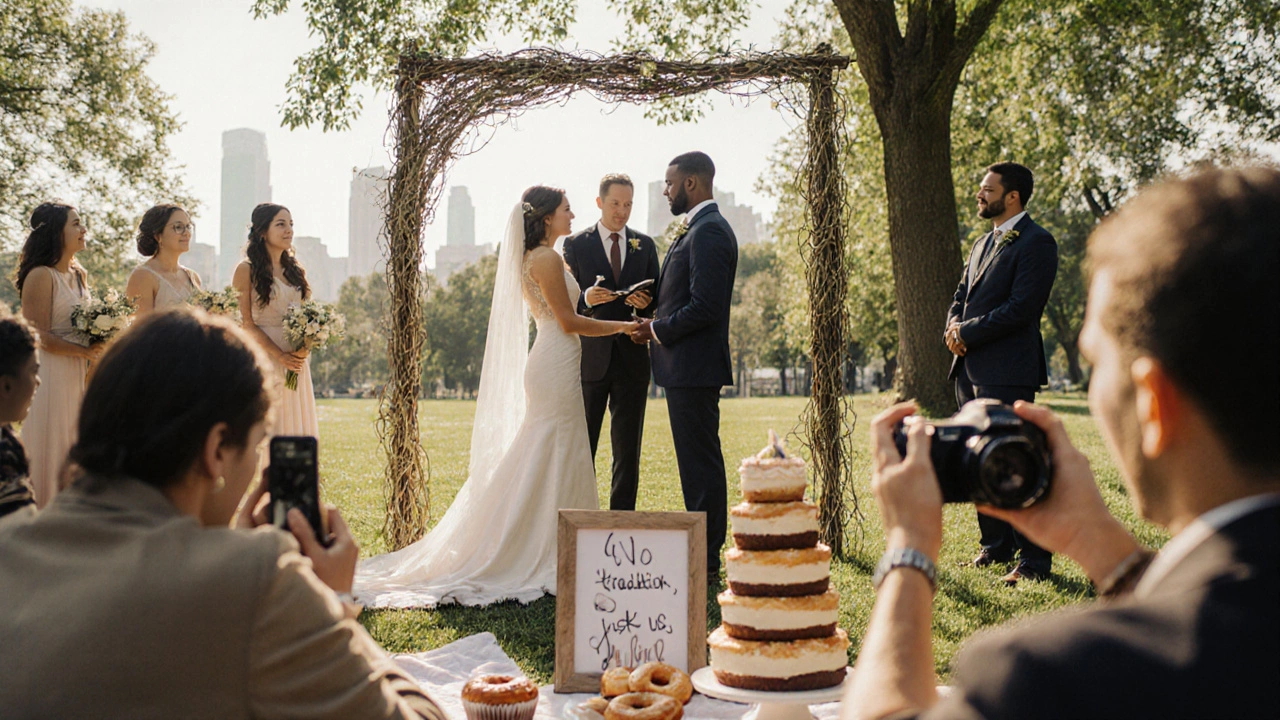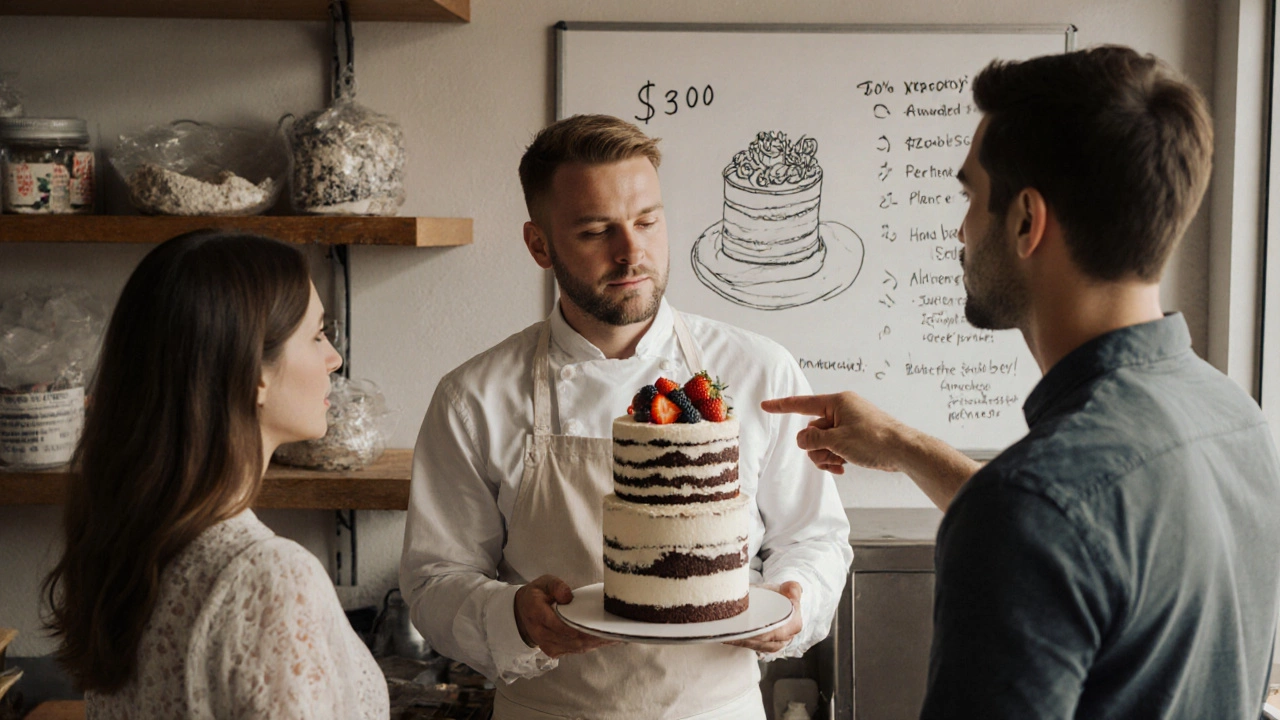Who Pays for a Wedding in 2024? Modern Rules for Couples and Families
 Nov, 11 2025
Nov, 11 2025
Wedding Budget Calculator
Your Budget Estimate
2024 Wedding Trends
Your Estimated Budget
Back in the day, the bride’s family paid for everything. The groom’s family covered the rehearsal dinner and maybe the honeymoon. But those old rules? They don’t fit anymore. In 2024, weddings are less about tradition and more about what works for the couple and their real-life finances. So who actually pays for a wedding today? The answer isn’t one person. It’s a conversation.
It’s Not About Who ‘Should’ Pay - It’s About Who Can
Forget the old script. No one’s keeping score anymore. What matters is how much money each side has available, what they’re comfortable spending, and what the couple actually wants. A couple in Melbourne might have parents who can chip in $10,000. Another couple’s parents might be helping with rent and can’t afford a cent toward the wedding. That’s okay.
More couples are paying for their own weddings now. According to a 2024 survey by Australian Wedding Trends, nearly 62% of couples covered 50% or more of their wedding costs themselves. That’s up from 41% in 2019. Why? Student debt, rising housing costs, and a shift in values. People want to get married on their terms - not their parents’.
How the Money Gets Split - Real Examples
There’s no one-size-fits-all. Here’s how it actually breaks down in 2024:
- Full couple pays: 35% of couples cover 100% of costs. Often younger couples, living independently, or with parents who can’t help.
- Split 50/50: 28% of couples split the cost equally with parents. This works well when both sets of parents can contribute.
- Couple + one set of parents: 22% have one family help out - usually the bride’s side, but increasingly the groom’s side too.
- Parents pay most: Only 15% of weddings are fully funded by parents. That’s down from nearly 40% in the 2000s.
One couple I know in Footscray paid for their whole wedding with savings from their jobs. They didn’t want to owe anyone. They cut costs by having the ceremony at a public park, using a friend as a photographer, and ordering their cake from a local home baker instead of a fancy studio. Their total? $12,500. Their parents gave them $3,000 as a gift - no strings attached.
What Each Side Typically Covers - If They Do
Even when families help, they don’t always pay for the whole thing. Here’s what’s common in 2024:
- Couple pays: Venue deposit, photography, music, attire, marriage license, honeymoon, and often the wedding cake. Many now choose to pay for their own cake because it’s personal - it reflects their taste, not tradition.
- Bride’s family: Still often covers the reception, catering, flowers, and sometimes the officiant. But not always. Some now just pay for the cake or the bar.
- Groom’s family: Used to pay for the rehearsal dinner and alcohol. Now, they might pay for the music, transportation, or the groom’s suit. Some give a cash gift instead.
There’s no rule that says the bride’s parents must pay for the cake. In fact, more couples are choosing to pay for it themselves - especially if they want something unique. A vegan, gluten-free, three-tier cake with hand-painted flowers? That’s not something most families want to foot the bill for unless they’re excited about it too.

Wedding Cake Makers and the New Budget Reality
Wedding cake makers are feeling the shift. In 2024, the average wedding cake in Australia costs $650 - down from $900 in 2019. Why? Couples are cutting back. Some skip the cake entirely. Others go for a dessert table with cupcakes, doughnuts, or a cheese wheel. A few even buy a cake from a supermarket and have a local cake maker decorate it.
Top cake makers in Melbourne now offer tiered pricing: a simple $300 cake, a mid-range $550 design, and a luxury $1,200+ creation. Many also offer payment plans. That’s new. Five years ago, you paid in full upfront. Now, you can pay 30% when you book, 30% two months out, and the rest the week before. It’s a response to tighter budgets.
One cake maker in Collingwood told me she now asks couples: ‘What’s your dream cake? And what’s your real budget?’ That question has replaced ‘What’s your family’s tradition?’
When Parents Offer to Pay - What to Say
It’s kind to want to help. But if your parents say, ‘We’ll pay for the whole thing,’ tread carefully. What if they expect you to invite their entire office? Or have a sit-down dinner with 150 guests when you wanted 60? Or pick a venue they love but you hate?
Here’s a better way: ‘We’re so grateful you want to help. We’ve made a budget based on what we can afford and what matters to us. If you’d like to contribute, we’d love to know how much you’re comfortable with. That way, we can plan around it - without pressure.’
That keeps the money flowing and the peace intact.

What Not to Do
Don’t let guilt drive your decisions. Don’t let one family’s spending become your standard. Don’t take money you can’t afford to repay. Don’t agree to a cake or a venue just because someone else wants it.
And don’t compare your wedding to others’. Social media makes it look like everyone’s having a $50,000 bash. They’re not. Most weddings in Australia cost between $15,000 and $25,000. Many are under $10,000.
Start the Conversation Early
Don’t wait until the invitations go out. Talk about money before you pick a venue, a photographer, or even a cake maker. Sit down with your partner. List your priorities. What’s non-negotiable? What can you cut?
Then talk to your families. Not in a group setting. One-on-one. Ask: ‘We’re planning our wedding and want to make smart choices. Do you have any amount you’d feel comfortable contributing? No pressure - we just want to know so we can plan.’
That simple question opens the door. It doesn’t demand. It invites.
Final Thought: The Wedding Is Yours
At the end of the day, your wedding is not your parents’ wedding. It’s not your aunt’s wedding. It’s yours. The cake, the venue, the music, the guest list - they all reflect who you are now. Not who your family was in 1995.
If your budget is tight, that’s okay. If your cake is $200 from a local baker who makes the best lemon drizzle in the city? Perfect. If your parents give you $5,000 and you pay the rest? That’s a win.
Weddings don’t have to cost a fortune to mean everything. And the people who matter? They’ll remember how you felt - not how much you spent.
Do parents still pay for weddings in 2024?
Some do, but fewer than before. In 2024, nearly two-thirds of couples pay at least half of their wedding costs themselves. Parents who help often contribute a set amount - like $5,000 to $15,000 - rather than covering the whole thing. It’s more about support than obligation.
Who pays for the wedding cake in 2024?
The couple usually pays for the cake themselves. It’s a personal choice - the design, flavor, and style reflect their taste. Even if parents offer to cover it, many couples prefer to choose their own cake maker and pay for it directly. This avoids pressure to meet someone else’s expectations.
Is it rude to ask family for money for a wedding?
No, if you ask respectfully. The key is to frame it as a conversation, not a demand. Say something like, ‘We’re putting together our budget and would love to know if you’d be open to helping in any way.’ That gives them space to say yes, no, or offer something different - like helping with food or music instead of cash.
What if my partner’s parents won’t contribute?
It’s not about fairness - it’s about reality. Some families simply can’t afford to help. Others don’t believe in spending heavily on weddings. Either way, it’s not a reflection on you. Focus on what you can do together. Many couples have beautiful weddings with no family financial help at all.
How much should we realistically budget for a wedding in 2024?
The average Australian wedding costs between $15,000 and $25,000. But many couples spend under $10,000 by choosing smaller guest lists, off-peak dates, DIY decor, and local vendors. If you’re paying yourself, aim to spend no more than 10-15% of your combined annual income. That keeps you from starting your marriage in debt.